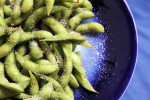
Soy bean foods may protect older women against osteoporosis – new findings
 Eating a diet rich in soy protein and isoflavones can protect older women from bone weakening and osteoporosis, according to the results of a preliminary study presented at the Society for Endocrinology Annual Conference in Edinburgh.
Eating a diet rich in soy protein and isoflavones can protect older women from bone weakening and osteoporosis, according to the results of a preliminary study presented at the Society for Endocrinology Annual Conference in Edinburgh.
Osteoporosis, where bones become brittle and fragile, is a common condition that affects over three million people in the UK. Every year there are more than 300,000 fragility fractures in the UK, that’s one every two minutes.
In women, bone loss occurs most quickly in the years immediately after menopause because they produce less of the sex hormone oestrogen, which protects against bone loss.
But soy bean foods contain chemicals known as isoflavones that are similar in structure to oestrogen and so could theoretically protect women against osteoporosis by copying the action of oestrogen.
So experts gave 200 women in early menopause a daily supplement containing soy protein with 66mg of isoflavones or a supplement with soy protein alone for six months. They recorded changes in the women’s bone activity by measuring certain proteins (βCTX and P1NP) in the blood.
They found that the women on the soy diet with isoflavones had significantly lower levels of βCTX than the women on soy alone, suggesting that their rate of bone loss was slowing down and lowering their risk of osteoporosis. Women taking soy protein with isoflavones were also found to have decreased risk of cardiovascular disease than those taking soy alone.
“We found that soy protein and isoflavones are a safe and effective option for improving bone health in women during early menopause,” highlights lead author, Thozhukat Sathyapalan. “The actions of soy appear to mimic that of conventional osteoporosis drugs.
“The 66 mg of isoflavone that we use in this study is equivalent to eating an oriental diet, which is rich in soy foods. In contrast, we only get around 2–16mg of isoflavone with the average western diet.
“Supplementing our food with isoflavones could lead to a significant decrease in the number of women being diagnosed with osteoporosis.”
For more in-depth features, interviews and information, subscribe to Arthritis Digest magazine, a popular title that’s published six times a year. Click here for the digital version or tel 0845 643 8470 to order your had copy. You’ll know what your doctor is talking about, what new drugs are in the pipeline and be up to date on helpful products
Image credit: Quinn Dombrowski
